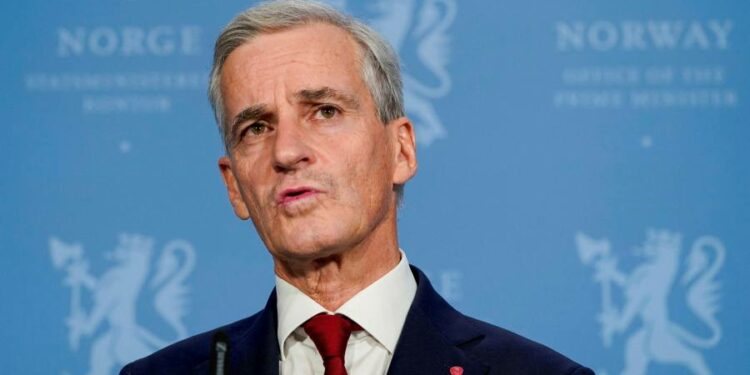Norway’s new prime minister has defended his country’s oil and gas industry by emphasising its shutdown would scupper the transition to greener industries such as renewable energy.
In his first newspaper interview as prime minister, Jonas Gahr Store told the Financial Times that if Norway, the biggest provider of gas to Europe behind Russia, were “out of business shortly” then the continent would struggle to reach its green goals too.
“If we were to say from one day to the other that we close down production from the Norwegian shelf, I believe that would put a stop to an industrial transition that is needed to succeed in the momentum towards net zero . . . So we are about to develop and transit, not close down,” he added.
Norway heads into the COP26 climate summit starting at the end of this month as western Europe’s largest petroleum producer but also ploughing significant money into green technologies such as electric cars, carbon capture and storage, and offshore wind.
Store agreed that this represented “a paradox” but argued it was not a Norwegian one but a global one as the world left behind “a couple of centuries of fossil fuel production”.
He stressed that Norway would meets its climate targets and obligations but claimed that the country of 5m people could make a bigger difference by developing green industry. “That will be important in Norway but it will have huge importance in Europe’s transition, in India’s transition, in Asia’s transition,” he added.
The country has set a target of achieving net zero carbon emissions by 2050.
The return to power of Store’s Labour party in Norway means all five Nordic countries have left-leaning prime ministers for the first time since 1959 and caps a centre-left revival that includes the victory of Social Democrat Olaf Scholz in Germany.
Store said he had been and remained in close contact with Scholz, who is discussing the terms of a coalition with Green and liberal parties, and emphasised their similarities as part of the “recovery in social democracy”.
“One reason is that people are seeing this growing inequality, they are seeing the insufficiency of right-leaning governments in managing the social part of the political agenda but also the technological and modern part of the energy transition,” Store said. “The other part is that social democracy has needed to find back its roots of representing the interests of people doing decent work.”
The new centre-left minority government is also keen to make its $1.4tn oil fund, the world’s largest sovereign wealth fund, more active in environmental matters. The government platform said it should become the leading asset manager in responsible investment as well as climate risk. The coalition also said it wanted more forceful regulation on the sale of shares in companies breaching human rights and International Labour Organization rules.
Store told the FT that the fund was “political”, a statement that marks a shift in a country where politicians have strived to say that it is not a tool of Norway’s foreign policy.
He stressed that it was run by professional managers, whose goal was to make “high returns within acceptable risk”.
But he added it was “the property of the Norwegian people, and it is up to the Norwegian government and parliament to set the framework. That makes it political, in my sense.”
However, the government was “clearly not picking winners or directing the details”, he said.
Officials at the fund have long thought its biggest risk is being seen abroad as an arm of the Norwegian state. They have sought to counteract that by stressing that its responsible investment framework — which includes bans on producers of tobacco, nuclear weapons and coal from the fund — is based on widely accepted international principles.
Store said that as the fund was owned by the Norwegian people and structured to “last for eternity”, “we would like to see the objectives and values of Norway reflected in the management of the fund”.
Store, a former foreign minister, showed a more internationalist inclination than his centre-right predecessor Erna Solberg, saying he would make an early trip to Brussels to discuss how Norway could help in the EU’s energy transition, and giving his first interviews to three European publications.
But he also criticised a European Commission suggestion to ban all oil and gas activity in the Arctic, which would affect Norway more than almost any other country due to activity in the Barents Sea.
“Resolutions coming out of continental Europe saying that everything north of the Polar Circle should arbitrarily be stopped — it doesn’t work like that. Norway is a coastal state from north to south, we have our rights and obligations to look after our economic zone and the activities in that zone,” he said.
But he added that his government would emphasise oil and gas exploration in “more mature areas and activities close to existing infrastructure”. This meant that the largely unexplored Barents Sea would be less in focus than the North and Norwegian Seas below the Arctic. Large oil companies, including state-controlled Equinor, have said they are scaling back their plans for the Barents Sea after a series of disappointing search results.











